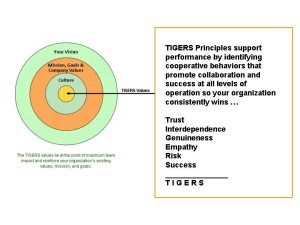 The best managers are those who possess an innate talent to lead, according to the findings of a recent Gallup poll. The survey, titled State of the American Manager: Analytics and Advice for Leaders , strives to pinpoint the qualities that great managers possess that set them apart.
The best managers are those who possess an innate talent to lead, according to the findings of a recent Gallup poll. The survey, titled State of the American Manager: Analytics and Advice for Leaders , strives to pinpoint the qualities that great managers possess that set them apart.
The TIGERS Success Series blog regularly publishes articles on effective management, including the following referenced articles:
- Include Leadership Team Building Events in your Organization to Promote Effective Leaders,
- Avoid Common Leadership Mistakes by Utilizing Leadership Team Building, and
- Avoid Becoming a Horrible Boss and Utilize Leadership Team Building Strategies .
With proper team building strategies, managers can improve their performances and develop into great leaders.
Look for top talent. According to the Gallup poll, companies that look for talent during the hiring process enjoy a 48 percent increase in profitability, a 19 decrease in employee turnover and a 22 percent increase in productivity. These managers are also more engaged, which leads to a 30 percent increase in employee engagement and a 17 percent increase in customer engagement, as well.
Top talent exhibits many positive attributes, according to Avoid Becoming a Horrible Boss and Utilize Leadership Team Building Strategies. Some ways that leaders stand out are by focusing on their employees, looking at the big picture, and uplifting, rather than bullying, their teams.
Focus on strengths. Effective managers understand how to play to their own strengths, as reported in Include Leadership Team Building Events in your Organization to Promote Effective Leaders. On top of understanding their own strengths, great managers understand the strengths of their team members, according to the Gallup results. By placing emphasis on their employees’ strengths rather than their weaknesses, great managers enjoy higher employee engagement, well-being, and productivity, as well as increased team profitability.
Focus on engagement. Great managers understand that their engagement levels directly influence their team members’ engagement levels. According to the Gallup results, employees who are supervised by highly engaged managers are 59 percent more likely to be engaged than those who are supervised by actively disengaged managers, which goes to prove that a manager’s engagement has a direct impact on their employees’ engagement. Engagement levels also affect profits, and Gallup estimates that managers who are not engaged or who are actively disengaged cost the U.S. economy $319 billion to $398 billion annually.
Leaders can promote greater levels of employee engagement by listening to those around them, says Avoid Common Leadership Mistakes by Utilizing Leadership Team Building. Effective leaders are less concerned with winning or being the smartest person in the room and are more concerned with listening and learning from their team members.
Grow candidates into leaders. According to the Gallup research, simply promoting employees to leadership roles because of their time served with the company does not lead to effective management.  Employees should be trained for positions that work with their personal talents, as individualized career paths based on talent lead to more effective teams. Organizations can utilize the TIGERS Den Leadership Training membership program to access valuable resources for their teams and leaders to create a cooperative work environment that helps leaders improve their leadership skills to grow their organizations in a scalable and measurable way.
Employees should be trained for positions that work with their personal talents, as individualized career paths based on talent lead to more effective teams. Organizations can utilize the TIGERS Den Leadership Training membership program to access valuable resources for their teams and leaders to create a cooperative work environment that helps leaders improve their leadership skills to grow their organizations in a scalable and measurable way.
Great managers are not simply promoted into their positions. Great managers have talent and important leadership skills that allow them to understand their positions and employees in an intimate way. Organizations can grow great managers by utilizing membership programs that train leaders to create and measure cooperative working environments.
Copyright TIGERS Success Series, Inc. by Dianne Crampton
About TIGERS Success Series, Inc.
 TIGERS is an Oregon Team Building Consultant residing in Bend, Oregon.
TIGERS is an Oregon Team Building Consultant residing in Bend, Oregon.
TIGERS is composed of six principles that build high performance teams and cooperative work communities. The six principles are trust, interdependence, genuineness, empathy, risk and success.
When all six principles are present in measurable team behavior there are high performance team outcomes. If one or two principles are missing or lacking in significance there are also predictable team problems.
Learn about the TIGERS Team Survey, which diagnoses and prescribes team strengths and weaknesses so you know exactly how to add training or team interventions your team needs most.